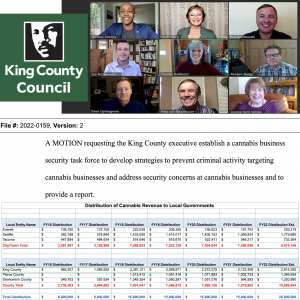The King County Council would decide whether or not to create a “cannabis business security task force” to convene in the months leading up to the county biennial budget season.
Here’s a look at cannabis-related policymaking events on the calendar in the week ahead.
Monday May 16th
At publication time, no cannabis-related policymaking events were scheduled.
Tuesday May 17th
WSLCB - Board Caucus
On Tuesday at 10am PT, the weekly Washington State Liquor and Cannabis Board (WSLCB) Board Caucus was scheduled to recur.
- [ Event Details ]
- At the previous week’s caucus, Chair David Postman indicated he would be on leave through this caucus.
King County Council - Council Meeting
On Tuesday at 1pm PT, the weekly Metropolitan King County Council Meeting was scheduled to recur.
- [ Event Details ]
- The Metropolitan King County Council would be asked to consider "A MOTION requesting the King County executive establish a cannabis business security task force to develop strategies to prevent criminal activity targeting cannabis businesses and address security concerns at cannabis businesses and to provide a report."
- The staff report on the legislation offered the following summary of effects:
- Proposed Motion 2022-0159 would request that the Executive address the recent increase in criminal activity targeting marijuana retailers across King County by establishing a marijuana retail security task force to develop strategies to prevent this criminal activity and enhance security at marijuana retail locations.
- Task force members would include, the King County Prosecuting Attorney’s Office (PAO), The King County Sheriff’s Office (KCSO), marijuana retail shop owners and impacted neighborhood groups and community organizations.
- The revised motion text more generally stated the task force should include “Cannabis business owners and employees.”
- The motion would further ask the Executive to prepare a report describing security and crime prevention strategies developed by the task force. The report is to include an analysis of staffing and resource needs across County government which would be required to develop and implement the task force developed strategies. The report should be submitted to Council by August 31, 2022.
- On April 5th, Councilmember Reagan Dunn introduced the motion which was referred to the Law, Justice, Health, and Human Services Committee (King County Council LJHHS).
- The Metropolitan King County Council, the legislative body of King County, consists of nine members elected by district to four-year terms. The Council adopts laws, sets policy, and holds final approval over the budget. The Council uses its committee structure to consider the legislation before it. Ordinances and motions (policy statements) are assigned to a King County Council committee for consideration, and then are recommended to the full Council for action. The King County Executive is not a member of the Council, and is a separately elected official. The Executive submits legislation to the Council for consideration and has veto power over ordinances passed by the Council.
- On May 3rd, the King County Council LJHHS met to amend, discuss, and recommend the proposed motion. The amendments by co-sponsor Councilmember Jeanne Kohl-Welles updated language to reflect contemporary ‘cannabis’ nomenclature and expanded the scope of the task force to include crimes committed against producer and processor licensees. A group of cannabis sector representatives offered public comment ahead of the proceedings.
- On May 17th, the full Council planned to convene and consider the motion, which draws attention to a 2020 change in the utilization of state cannabis excise tax funds allocated to the County.
- WHEREAS, while King County has traditionally allocated its portion of cannabis excise tax revenue collected by the state in accordance with RCW 69.54.540 to law enforcement activities by the King County sheriff's office, in 2020, the executive proposed, and the council approved, redirecting cannabis excise tax revenues away from the sheriff's office and toward community-based programs within the department of local services and the department of community and human services.
- King County has typically received around $2.2M from the annual state cannabis excise tax fund distribution. In the state fiscal year (FY) 2022, that amount was projected to increase to roughly $2.8M to reflect an overall increase in the state distribution from $15M to $20M. King County received the largest cannabis excise tax allotment from the state, more than double that of Pierce and Snohomish Counties, and surpassing the City of Seattle which was projected to receive roughly $1.75M in FY22.
- In the media release about the $12.59B King County FY21-22 biennial budget, the shift of cannabis excise tax revenues was highlighted as one of the county’s “Investments against racism.”
- The approved budget represents major investments against historical racism and oppression, including around the criminal legal system. The Council approved proposals to shift $4.6 million in marijuana excise tax revenue away from law enforcement and toward community-based programs that support reversing some of the disproportionate damage the war on drugs placed on Black communities.
- Deliberations on the King County FY23-24 budget would likely begin in October, led by Kohl-Welles as Chair of the Budget and Fiscal Management Committee.
- At publication time, Councilmember Dunn had served on the Council since 2009, introducing 810 pieces of legislation during that time. In 2022, he was campaigning to represent Washington’s 8th congressional district, describing himself as “a compassionate conservative who leads the Republican opposition against failed policies spreading from Seattle to our suburban neighborhoods. As a former federal prosecutor and Presidential appointee in the US Department of Justice, he is leading the fight to ‘re-fund the police’ and provide desperately needed support for our criminal justice system.”
- Reagan Dunn’s mother, Jennifer Dunn, represented the 8th congressional district in the United States House of Representatives from 1993 to 2005.
Wednesday May 18th
At publication time, no cannabis-related policymaking events were scheduled.
Thursday May 19th
At publication time, no cannabis-related policymaking events were scheduled.
Friday May 20th
At publication time, no cannabis-related policymaking events were scheduled.
